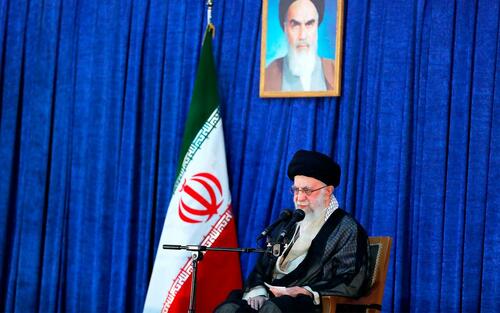
The Iranian government is apparently seeking to capitalize on the Israeli public and leadership being on edge due to continuing fears that an Iranian retaliation attack is imminent after last week's Israeli airstrike on Iran's embassy complex in Damascus.
An adviser to Iran’s supreme leader on Sunday has threatened to attack Iran's embassies, or at least strongly suggested it could happen. "The embassies of the Zionist regime are no longer safe," Yahya Rahim Safavi, senior adviser to Iran’s supreme leader Ayatollah Ali Khamenei, said according to ISNA news agency.

He added that the Islamic Republic views confrontation with Israel as a "legitimate and legal right" — given that Israel has just escalated through an unprecedented attack on a sovereign country's diplomatic facilities.
Iranian state media in conveying Safavi's words also featured graphics showing nine types of Iranian missiles that possess ranges capable of hitting Israel (see below).
Defense Minister Yoav Gallant on the same day announced that Israel is prepared and is ready to respond. Israel has "completed preparations for a response against any scenario that would develop against Iran," he said. Israel's embassies and consulates around the world continue to be on a high state of alert.
Meanwhile, an analyst from the Middle East Institute, Jason Brodsky, observed on Friday:
There are reports Iran's regime may be eyeing hitting an Israel diplomatic compound in a third country via drones & missiles. Israel maintains embassies in Bahrain; UAE; Jordan; Egypt; Azerbaijan; & Turkey. I would keep an eye on Jordan.
Currently, Israel is bracing for an inevitable response, and is reportedly calling up extra reserve forces. Hezbollah could also open up a bigger war front:
The leader of Lebanon’s Hezbollah movement said on Friday that Iran would inevitably retaliate after a strike — widely blamed on Israel — destroyed its consulate in Damascus this week, killing two generals.
“Be certain that Iran’s response to the targeting of its Damascus consulate is inevitable,” Hassan Nasrallah said in a televised speech marking Quds (Jerusalem) Day — an annual day of pro-Palestinian rallies held by Iran and its allies.
At least so far, the daily tit-for-tat fighting along Israel's northern border has remained contained, but perhaps just barely. Israeli leaders have warned that all of Lebanon could be bombed back to the 'stone age' if Hezbollah starts a full war. Prime Minister Netanyahu earlier spelled out that if a retaliation attack should be launched on Israel from Iranian soil, then Israel would hit back directly at Iran with a "stronger" response. This scenario would likely spiral into a major regional war, something the Biden administration says it is seeking to prevent.
ISNA has published an infographic of 9 Iranian-made missiles that it says are capable of hitting Israel. pic.twitter.com/EK1IjNaUJA
— Saeed Azimi (@SaeedAzimi1772) April 7, 2024
Meanwhile, in Gaza there's been a surprise development Sunday. "The Israeli military says it has withdrawn its ground troops from the southern Gaza Strip, including Khan Younis, amid conflicting reports about the scale and duration of the disengagement," writes Al Jazeera.
"Today, Sunday April 7th, the IDF’s 98th commando division has concluded its mission in Khan Younis. The division left the Gaza Strip in order to recuperate and prepare for future operations," the army said. One brigade has remained, and it's unclear precisely what this means related to the planned Rafah assault.
The Iranian government is apparently seeking to capitalize on the Israeli public and leadership being on edge due to continuing fears that an Iranian retaliation attack is imminent after last week’s Israeli airstrike on Iran’s embassy complex in Damascus.
An adviser to Iran’s supreme leader on Sunday has threatened to attack Iran’s embassies, or at least strongly suggested it could happen. “The embassies of the Zionist regime are no longer safe,” Yahya Rahim Safavi, senior adviser to Iran’s supreme leader Ayatollah Ali Khamenei, said according to ISNA news agency.

He added that the Islamic Republic views confrontation with Israel as a “legitimate and legal right” — given that Israel has just escalated through an unprecedented attack on a sovereign country’s diplomatic facilities.
Iranian state media in conveying Safavi’s words also featured graphics showing nine types of Iranian missiles that possess ranges capable of hitting Israel (see below).
Defense Minister Yoav Gallant on the same day announced that Israel is prepared and is ready to respond. Israel has “completed preparations for a response against any scenario that would develop against Iran,” he said. Israel’s embassies and consulates around the world continue to be on a high state of alert.
Meanwhile, an analyst from the Middle East Institute, Jason Brodsky, observed on Friday:
There are reports Iran’s regime may be eyeing hitting an Israel diplomatic compound in a third country via drones & missiles. Israel maintains embassies in Bahrain; UAE; Jordan; Egypt; Azerbaijan; & Turkey. I would keep an eye on Jordan.
Currently, Israel is bracing for an inevitable response, and is reportedly calling up extra reserve forces. Hezbollah could also open up a bigger war front:
The leader of Lebanon’s Hezbollah movement said on Friday that Iran would inevitably retaliate after a strike — widely blamed on Israel — destroyed its consulate in Damascus this week, killing two generals.
“Be certain that Iran’s response to the targeting of its Damascus consulate is inevitable,” Hassan Nasrallah said in a televised speech marking Quds (Jerusalem) Day — an annual day of pro-Palestinian rallies held by Iran and its allies.
At least so far, the daily tit-for-tat fighting along Israel’s northern border has remained contained, but perhaps just barely. Israeli leaders have warned that all of Lebanon could be bombed back to the ‘stone age’ if Hezbollah starts a full war. Prime Minister Netanyahu earlier spelled out that if a retaliation attack should be launched on Israel from Iranian soil, then Israel would hit back directly at Iran with a “stronger” response. This scenario would likely spiral into a major regional war, something the Biden administration says it is seeking to prevent.
ISNA has published an infographic of 9 Iranian-made missiles that it says are capable of hitting Israel. pic.twitter.com/EK1IjNaUJA
— Saeed Azimi (@SaeedAzimi1772) April 7, 2024
Meanwhile, in Gaza there’s been a surprise development Sunday. “The Israeli military says it has withdrawn its ground troops from the southern Gaza Strip, including Khan Younis, amid conflicting reports about the scale and duration of the disengagement,” writes Al Jazeera.
“Today, Sunday April 7th, the IDF’s 98th commando division has concluded its mission in Khan Younis. The division left the Gaza Strip in order to recuperate and prepare for future operations,” the army said. One brigade has remained, and it’s unclear precisely what this means related to the planned Rafah assault.
Loading…



